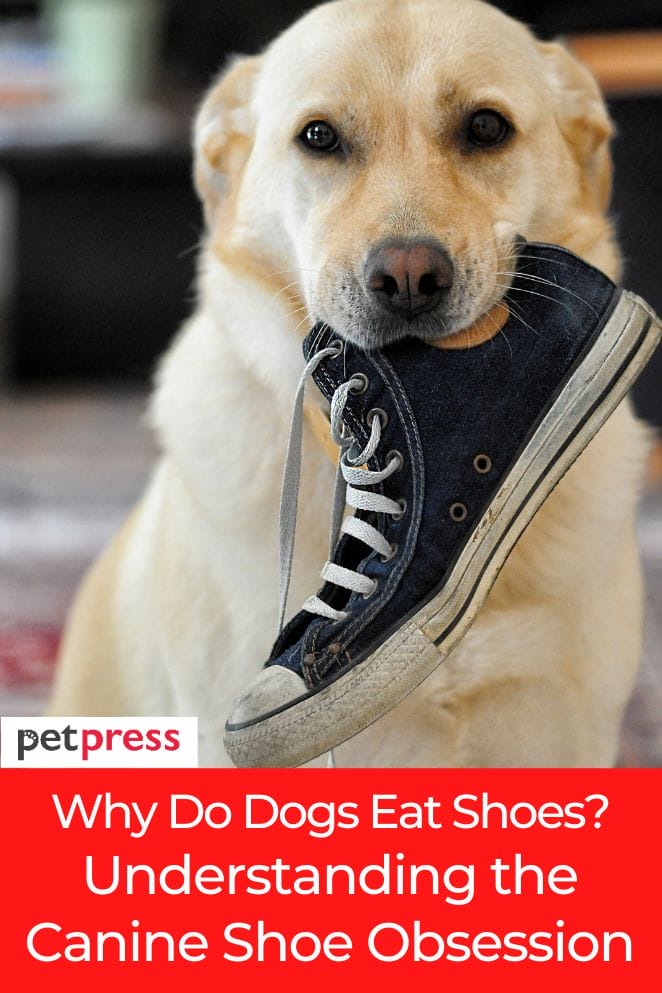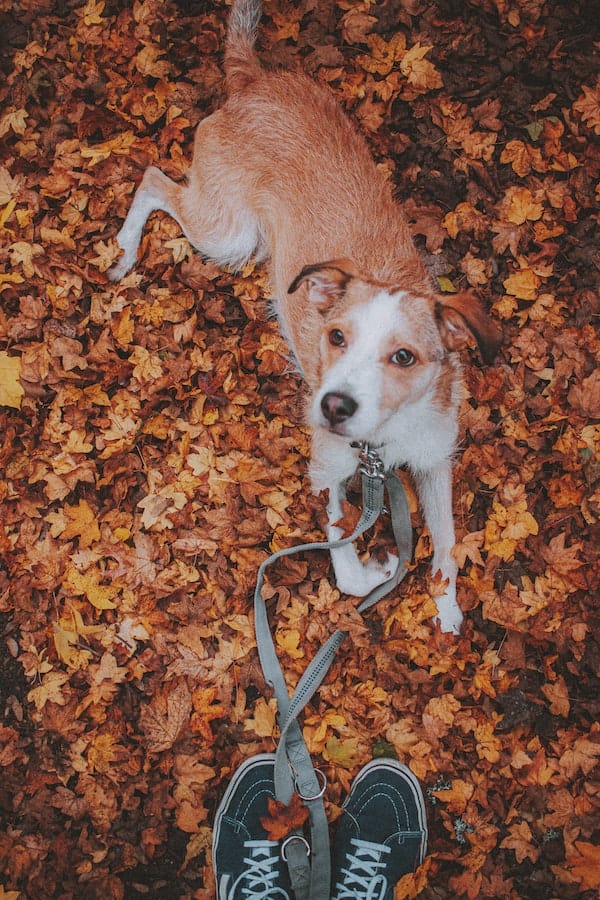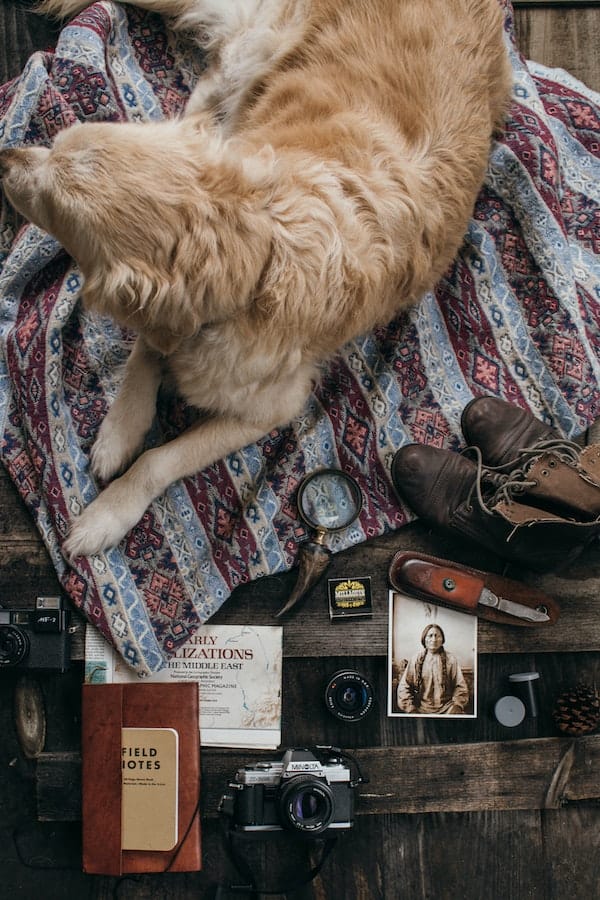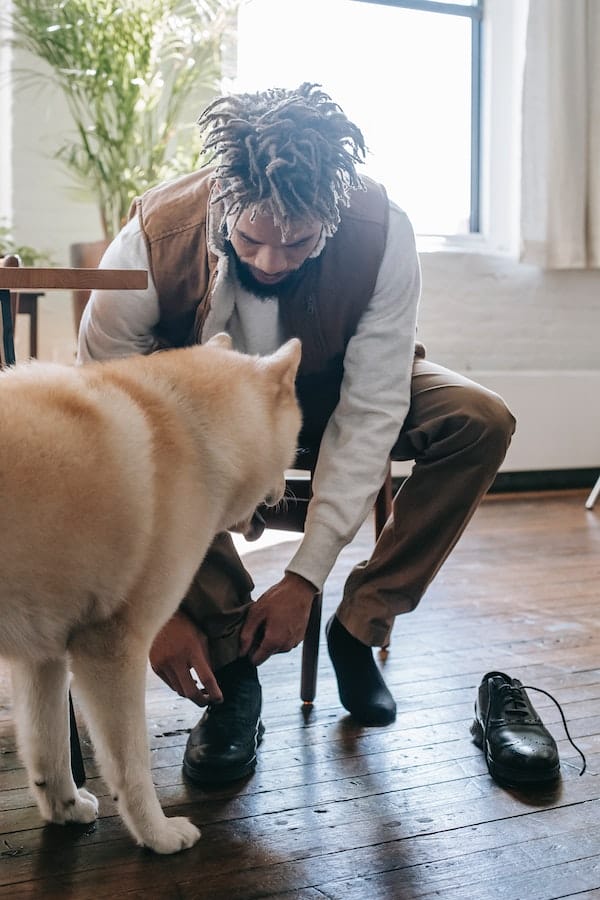
Have you ever come home to find your favorite pair of shoes in tatters, with your furry friend looking all too pleased with themselves?
If so, you’re not alone. Many dog owners have experienced the baffling behavior of their canine companions chewing on shoes.
In this article, we’ll delve into the curious world of why dogs eat shoes, explore tips to prevent this habit and provide you with valuable insights to keep your furry friend’s chewing tendencies in check.
Why Do Dogs Eat Shoes?

Dogs, with their endearing antics and unpredictable behaviors, often leave us wondering why they do what they do.
Chewing on shoes is a common behavior among dogs, and several reasons contribute to this seemingly mischievous act:
Teething
Much like human infants, puppies experience a teething phase as their baby teeth make way for their adult set.
This process can be uncomfortable and even painful for them.
Chewing helps alleviate the discomfort by providing counterpressure on their emerging teeth and massaging their tender gums.
The texture of shoes, with its combination of soft leather, fabric, and laces, often proves to be particularly satisfying for their teething gums.
It’s crucial for pet owners to recognize this natural urge to chew during teething and provide appropriate alternatives like teething toys or frozen treats designed to soothe their gums.
Boredom
Dogs are inherently active and intelligent animals.
When they don’t receive sufficient mental and physical stimulation, they can become restless and bored.
In such cases, they may resort to destructive behaviors like chewing on shoes as a way to pass the time and expend excess energy. T
his behavior serves as a double-edged sword for them – it not only provides a physical outlet but also engages their minds in exploring the textures, smells, and tastes of various objects, including your favorite pair of sneakers.
Anxiety and stress
Similar to humans, dogs can experience anxiety and stress.
When confronted with these emotional challenges, they may turn to chewing as a coping mechanism. Chewing on shoes provides them with a physical outlet for their anxiety, helping to alleviate their emotional distress.
The repetitive motion of gnawing on a shoe can be soothing for dogs, almost like a form of self-soothing therapy.
Identifying the source of your dog’s anxiety and working to address it, whether through behavioral training, environmental changes, or consulting with a veterinarian, can help reduce their inclination to chew on your shoes.
Exploration
Dogs are naturally curious creatures, and they explore the world primarily through their mouths.
Shoes, with their myriad textures, scents, and tastes, can be a captivating and enigmatic object for them to investigate.
The laces, in particular, can be irresistible as they mimic the feel of a satisfying tug-of-war game.
This exploratory behavior is an innate instinct, and while it may seem destructive, it’s essential for dogs to understand and interact with their environment.
To curb this shoe-chewing tendency, it’s crucial to offer alternative outlets for their curiosity, such as interactive toys, puzzle feeders, or even supervised outdoor adventures where they can engage their senses in a more constructive way.
Attention-seeking
Dogs are social animals, and they thrive on human interaction.
Sometimes, they may resort to chewing on shoes as a means to gain attention from their owners, even if it results in negative consequences.
They might have learned that when they chew on your shoes, they receive a reaction, whether it’s scolding or attempts to retrieve the chewed item.
To break this cycle, it’s vital to reinforce positive behaviors with attention and rewards.
When your dog engages in desirable actions or refrains from chewing on shoes, provide praise, treats, and affection to redirect their desire for attention onto more constructive activities.

Tips to Prevent Your Dog from Eating Shoes
Now that we’ve explored why dogs have a penchant for shoes, let’s discuss some practical tips to prevent this behavior:
Provide appropriate chew toys
Offering your dog a variety of safe and durable chew toys is a crucial step in redirecting their chewing instincts away from your precious shoes.
Opt for toys designed specifically for dogs, such as rubber or nylon chews, dental toys, or puzzle feeders.
These toys are not only satisfying to gnaw on but also promote dental health and mental stimulation.
Rotate their toys regularly to keep their interest piqued, as dogs can become bored with the same toys over time.
By providing an enticing array of chew options, you’ll help satisfy their natural urge to chew without resorting to your footwear.
Exercise and mental stimulation
An exercised dog is a happy dog, and a tired one is less likely to engage in destructive behaviors like shoe-chewing.
Ensure your furry friend gets enough physical activity through daily walks, playtime at the park, or interactive games of fetch.
Mental stimulation is equally vital; engage their intellect with puzzle toys or treat-dispensing toys that challenge them to work for their rewards.
Obedience training sessions can also provide mental exercise and strengthen your bond. A well-exercised and mentally stimulated dog is less likely to turn to your shoes as a pastime.
Create a shoe-free zone
Consider designating certain areas of your home as shoe-free zones, especially during your dog’s training phase.
This can help limit their access to your footwear and reduce the temptation to indulge in shoe-chewing.
Utilize baby gates or closed doors to separate these areas effectively.
Training and positive reinforcement
Training your dog using positive reinforcement techniques is a cornerstone of behavior modification.
Reward good behavior with treats, praise, or affection. When your dog refrains from chewing on shoes or redirects their attention to appropriate toys, celebrate their choice with enthusiasm.
Conversely, if they show interest in your footwear, gently but firmly discourage this behavior with a simple “no” and redirect them to their designated chew toys.
Consistency is key in reinforcing the message that shoes are off-limits.

Use bitter sprays
Pet-safe bitter-tasting sprays can be a valuable tool in deterring your dog from chewing on your shoes.
These sprays impart an unpleasant taste to the shoes, making them less appealing to your furry friend.
Apply the spray to the areas of your shoes that are most susceptible to chewing, and ensure it’s safe for pets by checking the label.
Over time, your dog will associate the bitter taste with the shoes, further discouraging the habit.
Crate training
Crate training can be highly beneficial, providing your dog with a safe and secure space when you’re not available to supervise them.
Dogs are den animals by nature, and a crate can mimic this natural instinct.
Ensure the crate is appropriately sized, allowing your dog enough room to stand, turn around, and lie down comfortably.
Introduce the crate gradually, using positive reinforcement to create positive associations with it.
When used correctly, a crate can prevent your dog from accessing your shoes and help reduce opportunities for shoe-chewing.
Consult a professional
If your dog’s shoe-chewing habit persists despite your best efforts, seeking guidance from a professional dog trainer or behaviorist is a wise step.
They can assess the specific triggers for the behavior and provide tailored training techniques to address it effectively.
Sometimes, underlying issues such as anxiety or compulsive behavior may require specialized attention.
Conclusion
In conclusion, understanding why dogs eat shoes is the first step in addressing this behavior effectively.
Dogs chew on shoes for various reasons, including teething, boredom, anxiety, and exploration.
By implementing the tips mentioned above and being patient with your furry friend, you can help prevent them from turning your favorite footwear into chew toys.
Remember, a well-exercised and mentally stimulated dog is less likely to engage in destructive behaviors, so keep them engaged and provide them with the love and attention they deserve.
FAQs
It can be. Excessive chewing or sudden changes in behavior should be discussed with your veterinarian to rule out any underlying health concerns.
Teething in dogs typically occurs between 3 and 7 months of age. You may notice increased drooling, irritability, and a strong desire to chew during this period.
Some breeds, especially puppies, may be more prone to chewing due to their innate characteristics. However, proper training and stimulation can help mitigate this behavior in all breeds.
Look for toys designed for puppies with softer textures that can soothe their gums. Be sure they are made of safe, non-toxic materials.
The time it takes to break the habit varies from dog to dog. Consistency in training and patience are key factors in successfully curbing this behavior.


GIPHY App Key not set. Please check settings